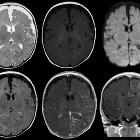progressive facial hemiatrophy









Parry-Romberg syndrome (PRS), also known as progressive facial hemiatrophy (PFH), is a rare progressive craniofacial disorder (phakomatosis).
It is classically characterized by a slowly progressive degeneration (atrophy) of the soft tissues of half of the face (hemifacial atrophy). This involves the skin, underlying soft tissues, cartilaginous structures and bone.
Epidemiology
There may be slightly increased prevalence in females. It is thought to be of sporadic onset.
Clinical presentation
It typically presents in childhood. The overlying craniofacial skin in the affected region may be hyperpigmented.
Associations
The condition is often accompanied by:
- seizures
- migraines
- hemiplegia
- trigeminal neuralgia
- linear scleroderma (en coup de saber)
Other possible associations include:
Radiographic features
CT/MRI brain
- may show atrophy on one side of the face +/- scalp
- high (T2/PD/FLAIR) signal of white matter within the ipsilateral and less commonly contralateral brain parenchyma has also been reported on MRI
- ipsilateral and less often contralateral leptomeningeal enhancement
- ipsilateral parenchymal atrophy
- ipsilateral cerebral microhemorrhages
- ipsilateral parenchymal calcification
- intracranial aneurysms
History and etymology
Caleb Hillier Parry was a British physician (1755-1822), and Moritz Heinrich Romberg was a German neurologist (1795-1873).
Siehe auch:
und weiter:

 Assoziationen und Differentialdiagnosen zu progressive faziale Hemiatrophie:
Assoziationen und Differentialdiagnosen zu progressive faziale Hemiatrophie:

